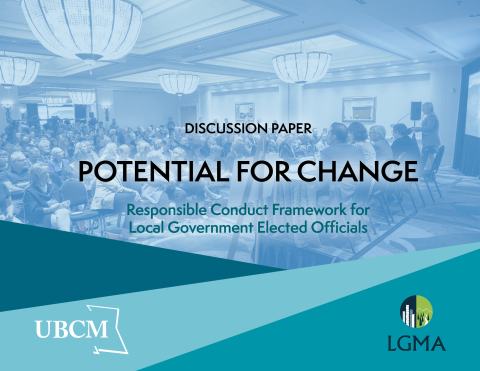Local elected officials and CAOs are invited to provide comment on the potential for change to the framework that supports responsible conduct in BC. The invitation follows on a discussion paper from UBCM and the Local Government Management Association that explores the potential of mandatory codes of conduct and models for their administration and enforcement. The paper follows a succession of UBCM resolutions that call for changes to the responsible conduct framework for local elected officials. The deadline for feedback has been extended to December 1, 2024.
The Potential for Change weighs the merits of a province-wide office of integrity and introduces a new option for local governments to consider to support code of conduct enforcement.
The current framework
British Columbia’s current framework gives local governments a high level of choice, including deciding whether to adopt a code of conduct. One rationale for this flexibility is that it enables local governments to create Council and Board cultures that foster responsible conduct. This enabling approach has supported considerable development – approximately 130 of the province’s 188 local governments have now implemented codes of conduct.
The current approach, though, has also left considerable gaps in the system. Thirty percent of local governments do not have a code of conduct, and among those that do, there is significant diversity in the thoroughness and effectiveness of the codes. In addition, local governments have consistently said, through UBCM resolutions and other means, that more resources are needed in order for them to administer and enforce codes of conduct. There also has been consistent feedback that the current model places a strain on administrators and, in cases where conduct issues have become entrenched, has not led to the effective resolution of issues.
Alternative models for administration and enforcement
UBCM members have adopted several resolutions in recent years calling for a province wide integrity or ethics commissioner. The paper notes that such an office to undertake its mission would require that every local government have a code of conduct, most likely with standardized feature.
Potential for Change identifies several challenges with a province-wide office to support code of conduct administration and enforcement, which include capacity necessary to respond in a timely fashion to the needs of 188 local governments, cost containment; uncertainty whether the Province would fund such an office. The paper also notes that such an office would be unlikely to have powers for sanctions and enforcement beyond those already available to local governments. The paper also asks whether a shift to a centralized authority would weaken the current commitment shown by many local governments to fostering a culture of responsible conduct.
As a third option between the status quo and a provincial office, the paper highlights a model similar to those adopted in Ontario in Manitoba which require local governments to adopt a code of conduct (with varying degrees of standardization) and appoint an independent third party to support administration and enforcement. This approach would ensure that codes of conduct are in place before problems arise, and that they meet a basic standard of completeness. It also ensures there are sound procedures in place for every community for dealing with issues. This approach leaves the option open for local governments to work with neighbours within a regional district to share the cost for an independent third party.
Your opportunity for feedback
Co-authors of the paper – Local Government Management Association and UBCM – are inviting feedback from Councils/Boards, individual elected officials and CAOs on two questions:
- Should the Province be requested to develop legislation mandating codes of conduct modelled on established best practices for all local governments in BC?
- Are legislated changes needed to support code of conduct administration and enforcement? And, if so, what factors do you think are most important to the success of a new approach to code administration and enforcement?
Responses from Councils, Boards or individual elected officials may be sent to Paul Taylor, UBCM Director of Communications. Chief Administrative Officers may provide their comments to Candace Witkowskyj, LGMA Executive Director.

